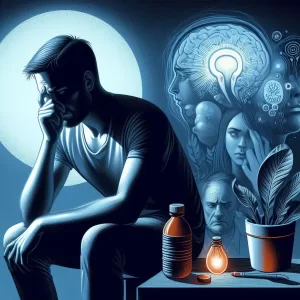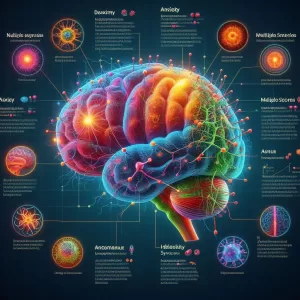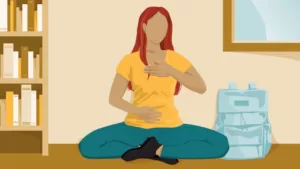What is Bipolar Disorder?
Désolé, aucun message n'a été trouvé.
## What is Bipolar Disorder?
Bipolar disorder, formerly known as manic depression, is a serious mental illness that causes extreme mood swings that include emotional highs (mania or hypomania) and lows (depression). These mood swings can interfere with a person’s ability to work, study, sleep, eat, and maintain relationships.
**Keywords:** Bipolar disorder, mood swings, mania, hypomania, depression
### Symptoms of Bipolar Disorder
**Mania or Hypomania:**
* Feeling euphoric, overly happy, or irritable
* Racing thoughts and rapid speech
* Increased energy and activity levels
* Decreased need for sleep
* Impulsive behavior, such as spending sprees or reckless sexual activity
* Inflated self-esteem or grandiose delusions
**Depression:**
* Feeling sad, hopeless, or worthless
* Loss of interest in activities that were once enjoyable
* Changes in appetite or sleep patterns
* Fatigue or lack of energy
* Difficulty concentrating or making decisions
* Suicidal thoughts or behaviors
### Types of Bipolar Disorder
There are several types of bipolar disorder, including:
* **Bipolar I Disorder:** Characterized by at least one episode of full-blown mania that may or may not be accompanied by depressive episodes.
* **Bipolar II Disorder:** Characterized by at least one hypomanic episode and one major depressive episode.
* **Cyclothymic Disorder:** Characterized by repeated periods of hypomania and depressive symptoms that do not meet the criteria for full-blown episodes.
### Causes of Bipolar Disorder
The exact cause of bipolar disorder is unknown, but it is thought to be caused by a combination of factors, including:
* **Genetics:** Bipolar disorder tends to run in families, suggesting a genetic component.
* **Neurochemical imbalances:** People with bipolar disorder have abnormal levels of certain neurotransmitters, such as dopamine and serotonin, in their brains.
* **Environmental factors:** Stressful events, such as trauma or loss, can trigger episodes of bipolar disorder in those who are genetically predisposed.
### Treatment for Bipolar Disorder
Treatment for bipolar disorder typically involves a combination of medications and psychotherapy.
**Medications:**
* **Mood stabilizers:** Lithium, valproate, and lamotrigine are commonly used to prevent or reduce mood swings.
* **Antipsychotics:** These medications are used to treat mania or hypomania.
* **Antidepressants:** These medications may be used to treat depression in people with bipolar disorder, but they should be used with caution as they can trigger manic episodes.
**Psychotherapy:**
* **Cognitive behavioral therapy (CBT):** This therapy helps people with bipolar disorder to identify and change negative thought patterns and behaviors that contribute to their mood swings.
* **Family-focused therapy:** This therapy involves helping family members learn about bipolar disorder and how to support their loved one.
* **Interpersonal and social rhythm therapy (IPSRT):** This therapy focuses on regulating sleep-wake cycles and improving social functioning.
### Outlook for People with Bipolar Disorder
With proper treatment, people with bipolar disorder can live full and productive lives. However, it is important to note that this is a lifelong condition that requires ongoing management.
**If you or someone you know is experiencing symptoms of bipolar disorder, it is important to seek professional help immediately.**
2 commentaires
Laisser un commentaire
Articles populaires








[Everything You Need to Know](/bipolar-disorder/what-is-bipolar-disorder)
[Everything you need to know about Bipolar Disorder](/bipolar-disorder)